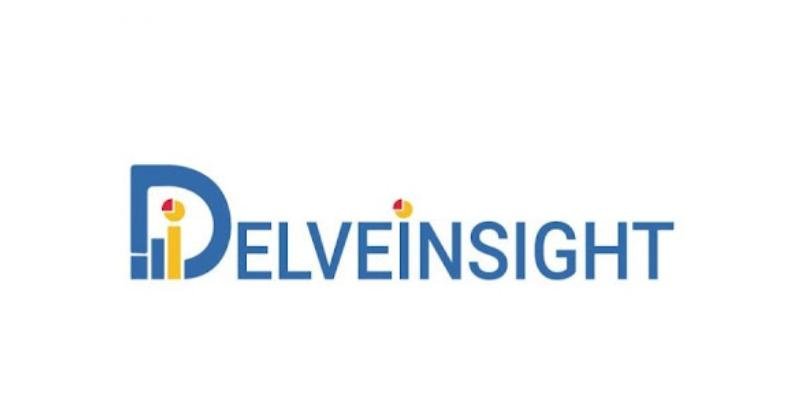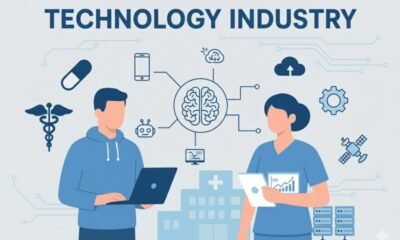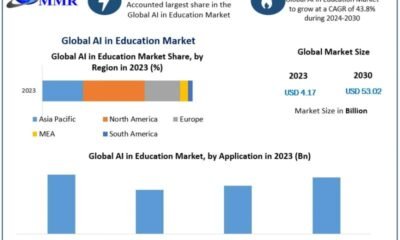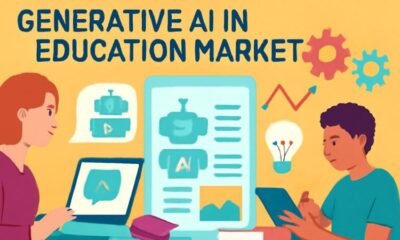According to DelveInsight’s analysis, The demand for Artificial Intelligence in clinical trials is experiencing strong growth, primarily driven by the rising global prevalence of chronic conditions like diabetes, cardiovascular diseases, respiratory illnesses, and cancer. This growth is further supported by increased investments and funding dedicated to advancing drug discovery and development efforts. Additionally, the growing number of strategic collaborations and partnerships among pharmaceutical, biotechnology, and medical device companies is significantly boosting the adoption of AI-driven solutions in clinical trials. Together, these factors are anticipated to fuel the expansion of the AI in the clinical trials market during the forecast period from 2025 to 2032.
DelveInsight’s “Artificial Intelligence (AI) in Clinical Trials Market Insights, Competitive Landscape and Market Forecast-2032” report provides the current and forecast market outlook, forthcoming device innovation, challenges, market drivers and barriers. The report also covers the major emerging products and key Artificial Intelligence (AI) in Clinical Trials companies actively working in the market.
To know more about why North America is leading the market growth in the Artificial Intelligence (AI) in Clinical Trials market, get a snapshot of the report Artificial Intelligence (AI) in Clinical Trials Market Trends
https://www.delveinsight.com/sample-request/ai-in-clinical-trials-market?utm_source=openpr&utm_medium=pressrelease&utm_campaign=gpr
Artificial Intelligence (AI) in Clinical Trials Overview
Artificial Intelligence (AI) in clinical trials refers to the use of advanced machine learning algorithms and data analytics to streamline and improve various aspects of clinical research. AI enhances trial design, patient recruitment, site selection, and data analysis by identifying patterns and predicting outcomes. It enables faster patient matching, optimizes protocol design, reduces trial timelines, and improves data quality and monitoring. AI also helps in real-time adverse event detection and adaptive trial management, making clinical trials more efficient, cost-effective, and patient-centric.
DelveInsight Analysis: The global Artificial Intelligence in clinical trials market size was valued at USD 1,350.79 million in 2024 and is projected to expand at a CAGR of 12.04% during 2025-2032, reaching approximately USD 3,334.47 million by 2032.
Artificial Intelligence (AI) in Clinical Trials Market Insights
Geographically, North America is expected to lead the AI in the clinical trial market in 2024, driven by several critical factors. The region’s growing burden of chronic diseases, substantial investments in R&D, and the rising volume of clinical trials contribute significantly to this dominance. Additionally, an increasing number of collaborations and partnerships among pharmaceutical and medical device companies, along with the advancement of sophisticated AI solutions, are accelerating market expansion. These developments are enhancing the ability to manage complex clinical trials efficiently, driving the adoption of AI technologies and supporting the market’s growth in North America throughout the forecast period from 2025 to 2032.
To read more about the latest highlights related to Artificial Intelligence (AI) in Clinical Trials, get a snapshot of the key highlights entailed in the Artificial Intelligence (AI) in Clinical Trials
https://www.delveinsight.com/report-store/ai-in-clinical-trials-market?utm_source=openpr&utm_medium=pressrelease&utm_campaign=gpr
Recent Developments in the Artificial Intelligence (AI) in Clinical Trials Market Report
• In May 2025, Avant Technologies, Inc. (OTCQB: AVAI) and joint venture partner Ainnova Tech, Inc. announced the initiation of acquisition discussions aimed at enhancing their presence in the rapidly growing AI-powered healthcare sector.
• In March 2025, Suvoda introduced Sofia, an AI-driven assistant created to optimize clinical trial management processes. Sofia aids study teams by providing quick access to essential trial data and real-time, intelligent insights. This tool boosts operational efficiency, minimizes manual tasks, and helps teams make faster, data-informed decisions throughout the clinical trial journey.
• In December 2024, ConcertAI and NeoGenomics unveiled CTO-H, an advanced AI-powered software platform designed to enhance research analytics, clinical trial design, and operational efficiency. CTO-H provides an extensive research data ecosystem, offering comprehensive longitudinal patient data, deep biomarker insights, and scalable analytics to support more precise, efficient, and data-driven clinical development processes.
• In June 2024, Lokavant introduced SpectrumTM, the first AI-powered clinical trial feasibility solution aimed at enhancing trial performance throughout the clinical development process. Spectrum enables study teams to forecast, control, and improve trial timelines and expenses in real-time.
• Thus, owing to such developments in the market, rapid growth will be observed in the Artificial Intelligence (AI) in Clinical Trials market during the forecast period
Key Players in the Artificial Intelligence (AI) in Clinical Trials Market
Some of the key market players operating in the Artificial Intelligence (AI) in Clinical Trials market include- TEMPUS, NetraMark, ConcertAI, AiCure, Medpace, Inc., ICON plc, Charles River Laboratories, Dassault Systèmes, Oracle, Certara, Cytel Inc., Phesi, DeepHealth, Unlearn.ai, Inc., H1, TrialX, Suvoda LLC, Risklick, Lokavant, Research Solutions, and others.
Which MedTech key players in the Artificial Intelligence (AI) in Clinical Trials market are set to emerge as the trendsetter explore @ Key Artificial Intelligence (AI) in Clinical Trials Companies
https://www.delveinsight.com/sample-request/ai-in-clinical-trials-market?utm_source=openpr&utm_medium=pressrelease&utm_campaign=gpr
Analysis on the Artificial Intelligence (AI) in Clinical Trials Market Landscape
To meet the growing needs of clinical trials, leading companies in the AI in Clinical Trials market are creating advanced AI solutions aimed at improving trial efficiency, optimizing patient recruitment, and enhancing clinical trial design at investigator sites. For example, in April 2023, ConcertAI introduced CTO 2.0, a clinical trial optimization platform that utilizes publicly available data and partner insights to deliver comprehensive site and physician-level trial data. This tool provides key operational metrics and site profiles to evaluate trial performance and site capabilities. Additionally, CTO 2.0 assists sponsors in complying with FDA requirements for inclusive trial outcomes, promoting a shift toward community-based trials with more streamlined and patient-centric designs.
As a result of these advancements, the software segment is projected to experience significant growth throughout the forecast period, contributing to the overall expansion of the AI in the clinical trials market.
Scope of the Artificial Intelligence (AI) in Clinical Trials Market Report
• Coverage: Global
• Study Period: 2022-2032
• Artificial Intelligence (AI) in Clinical Trials Market Segmentation By Product Type: Software and Services
• Artificial Intelligence (AI) in Clinical Trials Market Segmentation By Technology Type: Machine Learning (ML), Natural Language Processing (NLP), and Others
• Artificial Intelligence (AI) in Clinical Trials Market Segmentation By Application Type: Clinical Trial Design & Optimization, Patient Identification & Recruitment, Site Identification & Trial Monitoring, and Others
• Artificial Intelligence (AI) in Clinical Trials Market Segmentation By Therapeutic Area: Oncology, Cardiology, Neurology, Infectious Disease, Immunology, and Others
• Artificial Intelligence (AI) in Clinical Trials Market Segmentation By End-User: Pharmaceutical & Biotechnology Companies and Medical Device Companies
• Artificial Intelligence (AI) in Clinical Trials Market Segmentation By Geography: North America, Europe, Asia-Pacific, and Rest of the World
• Key Artificial Intelligence (AI) in Clinical Trials Companies: TEMPUS, NetraMark, ConcertAI, AiCure, Medpace, Inc., ICON plc, Charles River Laboratories, Dassault Systèmes, Oracle, Certara, Cytel Inc., Phesi, DeepHealth, Unlearn.ai, Inc., H1, TrialX, Suvoda LLC, Risklick, Lokavant, Research Solutions, and others
• Porter’s Five Forces Analysis, Product Profiles, Case Studies, KOL’s Views, Analyst’s View
Interested in knowing how the Artificial Intelligence (AI) in Clinical Trials market will grow by 2032? Click to get a snapshot of the Artificial Intelligence (AI) in Clinical Trials Market Analysis
https://www.delveinsight.com/sample-request/ai-in-clinical-trials-market?utm_source=openpr&utm_medium=pressrelease&utm_campaign=gpr
Table of Contents
1 Artificial Intelligence (AI) in Clinical Trials Market Report Introduction
2 Artificial Intelligence (AI) in Clinical Trials Market Executive summary
3 Regulatory and Patent Analysis
4 Artificial Intelligence (AI) in Clinical Trials Market Key Factors Analysis
5 Porter’s Five Forces Analysis
6 COVID-19 Impact Analysis on Artificial Intelligence (AI) in Clinical Trials Market
7 Artificial Intelligence (AI) in Clinical Trials Market Layout
8 Global Company Share Analysis – Key Artificial Intelligence (AI) in Clinical Trials Companies
9 Company and Product Profiles
10 Project Approach
11 Artificial Intelligence (AI) in Clinical Trials Market Drivers
12 Artificial Intelligence (AI) in Clinical Trials Market Barriers
13 About DelveInsight
Latest Reports by DelveInsight
• Percutaneous Arterial Closure Device Market: https://www.delveinsight.com/report-store/vascular-closure-devices-market
• Transdermal Drug Delivery Devices: https://www.delveinsight.com/report-store/transdermal-drug-delivery-devices-market
• Infusion Pumps Market: https://www.delveinsight.com/report-store/infusion-pumps-market
• Acute Radiation Syndrome Market: https://www.delveinsight.com/report-store/acute-radiation-syndrome-pipeline-insight
• Human Papillomavirus Hpv Market: https://www.delveinsight.com/report-store/human-papillomavirus-hpv-market
• Blood Gas And Electrolyte Analyzers Market: https://www.delveinsight.com/report-store/blood-gas-and-electrolyte-analyzers-market
Contact Us
Gaurav Bora
info@delveinsight.com
+14699457679
www.delveinsight.com
Connect With Us at:
LinkedIn | Facebook | Twitter
About DelveInsight
DelveInsight is a leading Business Consultant and Market Research firm focused exclusively on life sciences. It supports Pharma companies by providing end-to-end comprehensive solutions to improve their performance.
Get hassle-free access to all the healthcare and pharma market research reports through our subscription-based platform PharmDelve.
This release was published on openPR.









































